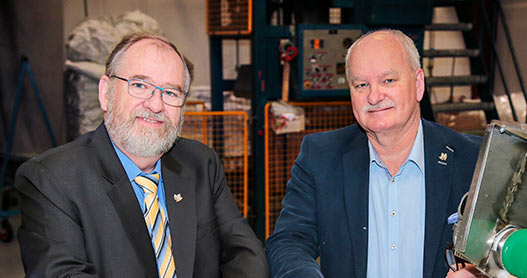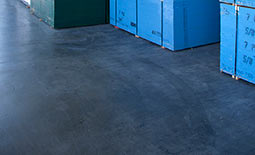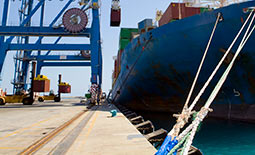
Applications of construction fibres
Fibres for tunnels and fire protection
We have developed a range of certified construction fibres for tunnel constructions. The fibres are designed to improve fire protection and increase tensile strength.
In recent years, there have been several fires in European concrete tunnels. As a consequence, the prevention of explosive fragmentation in concrete has become crucially important for securing safe tunnels.
Explosive fragmentation in concrete tunnels
The phenomenon of explosive fragmentation occurs when concrete is exposed to high temperatures, e.g. in case of a hydrocarbon fire.
Especially for tunnel constructions, a condensed high-quality concrete is used, which has a low permeability. This means that pores in the concrete are easily saturated with moisture. In case of fire, heat will cause the moisture to evaporate, which again will lead to an increase in pressure inside the concrete pores. As a result, the concrete will fragment explosively. This explosive fragmentation can happen very quickly and it is therefore important to reduce the risk.
Reducing the risk of explosive fragmentation
A range of our Wiking® Micro Fibres are especially developed for reducing the risk of explosive fragmentation in concrete. When adding these fibres to the concrete mix, the permeability of the concrete will increase during heating, whereby the pressure in the pores is reduced. This means that the overall risk of explosive fragmentation is reduced.
The explanation for this is that Wiking® Micro Fibres will begin to melt at 160°C, and at 360°C the fibres will be completely dissolved, adding millions of capillaries to the concrete for moisture to escape. As a consequence, there will be no pressure and therefore no explosive fragmentation.
Increased time to safely escape
The reduction of explosive fragmentation means that a rescue team will have more time to gain control of a fire and evacuate people. Lives may therefore be saved. In fact, studies show that Wiking® Micro Fibres can increase the available safe escape time from 20 minutes to 70-90 minutes!
Fibres for a proactive prevention of plastic shrinkage
Another advantage of Wiking® Micro Fibres is that they form a three-dimensional matrix in the concrete mix, which proactively prevents the formation of plastic shrinkage cracks in concrete.
Tunnel certification
Wiking® Micro Fibres for tunnels have been approved in accordance with AbZ (Allgemeine bauaufsichtliche Zulassung – German national construction approval). This guarantees that our fibres meet the required levels of quality in relation to tensile strength and passive fire protection. Only three companies in the world hold this certification for tunnel fibres.
Advantages of Wiking®
Micro Fibres for
tunnels:
- Reduced risk of explosive fragmentation
- Improved resistance to plastic shrinkage and settlement cracks
- Increased time to safely escape
- Extra three-dimensional reinforcement structure
Other applications:
- Skyscrapers
- Bridges
- Underground parking spaces
- Cable tunnels
Certified Wiking® Micro Fibres for tunnels:
- Wiking® Micro 18 μm
- Wiking® Micro 15 μm
Read more









